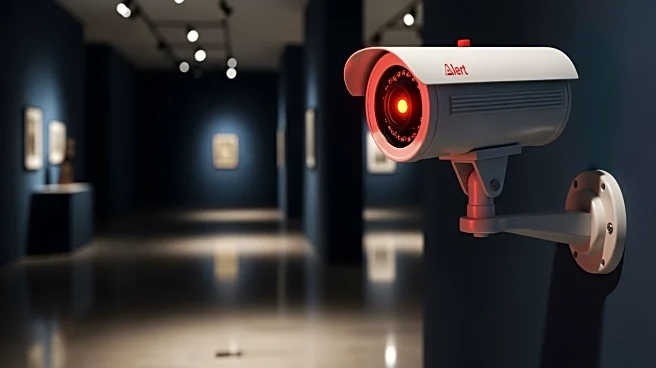What's Happening?
The French government has initiated a comprehensive security review at the Louvre Museum and other cultural sites following a daring heist that occurred in broad daylight. On Sunday, four individuals used
a crane to break into the Louvre, smashing an upstairs window and stealing priceless crown jewels from a gallery dedicated to royal jewelry. The thieves made their escape on motorbikes, leaving behind a scene that some politicians have described as a national humiliation. The incident has prompted questions about the adequacy of security measures at the Louvre, which is the world's most visited museum, attracting 8.7 million visitors in 2024. Justice Minister Gerard Darmanin acknowledged the security failure, while Culture Minister Rachida Dati emphasized the need to enhance security protocols for artworks, not just visitors.
Why It's Important?
The heist at the Louvre has significant implications for the security of cultural heritage sites in France and potentially worldwide. As one of the most well-funded museums globally, the Louvre's vulnerability highlights the need for improved security measures across all museums. The theft of royal jewelry, including items from Queen Marie-Amélie and Queen Hortense, represents a loss of cultural heritage and raises concerns about the protection of historical artifacts. The incident has sparked political debate, with leaders from various parties expressing dismay over the country's ability to safeguard its cultural assets. The event underscores the importance of balancing public access to cultural sites with the need for robust security to prevent such audacious crimes.
What's Next?
In response to the heist, the French Culture and Interior Ministers have agreed to investigate the security lapses and implement necessary enhancements at cultural institutions nationwide. The probe into the robbery has been assigned to a specialist police unit known for its success in solving high-profile thefts. The government is considering shortcuts to public procurement rules to expedite security improvements. As the investigation unfolds, there may be increased scrutiny on museum security protocols globally, prompting other institutions to reassess their measures to prevent similar incidents. The political discourse surrounding the heist may also influence future policy decisions regarding cultural heritage protection.
Beyond the Headlines
The Louvre heist raises broader questions about the allocation of resources for cultural preservation and the challenges faced by museums in securing their collections. Despite being well-funded, the Louvre's security breach suggests that financial resources alone may not suffice to prevent sophisticated thefts. The incident may lead to a reevaluation of security strategies, including the integration of advanced technologies and collaboration with international security experts. Additionally, the heist could influence public perception of museum security, potentially affecting visitor confidence and attendance at cultural sites.










